| |
"When the law prosecutes the innocent, that's the end of it." |
| |
Katz, the barber |
| |
"Am I going mad, or has the world gone mad?" |
| |
Mrs. Lautmannová |
Some time last year, I can't remember where, I came across a semi-satirical and ever-so-slightly cynical article which listed criteria that could almost guarantee a film an Oscar nomination and probable win. Some of these were silly, coincidental similarities between otherwise very different films that were clearly meant to be taken with a big pinch of salt. But others had a small ring of truth about them, such as a long-standing and popular actor or director's failure to win in previous years and the perceived need to hand them a gold statuette before they pop their clogs. Another, perhaps more controversial contender was to make a worthy and serious-minded film about the Holocaust.
This rather suspect claim was born of the fact that of the 22 Holocaust themed films that had received Academy Award nominations over the years (as of March of last year), 20 of them had won in at least one category. Of course, right-wing conspiracy nuts and those most loathsome of creatures, the Holocaust deniers, would be quick to cite this as further evidence that the American media and entertainment industry is somehow under Jewish control, which is exactly the sort of thinking that started Germany on the path to mass extermination in the first place. And take a look at the films, for pity's sake. By their very nature, Holocaust stories have one of the most horrific events in all of modern history to draw on, one whose scale and calculated monstrosity is so great that it's almost impossible for those who were not there to fully comprehend. There are thus a myriad of stories to be told about what people went through during this dreadful time, and it's hardly surprising that so many of them are told with such conviction and moving sense of purpose. These are films whose personal stories encompass universal themes, of man's inhumanity to man and his capacity for unspeakable evil. And just when it seemed that there was nothing new for a dramatic feature to say about this terrible crime against humankind, along comes László Nemes' astonishing (and Oscar-winning) Son of Saul this very year to disprove that assumption.

Back in the 1950s and 60s, such films were considerably less common than they subsequently became, in part because the memories they provoked and from which they drew inspiration were still a deemed a little too fresh for public consumption. The door was effectively opened for American cinema by George Stevens' triple Oscar-winning The Diary of Anne Frank, and six years later the Slovak film Obchod na korze (known as The Shop on the High Street in the UK and the colloquially adjusted The Shop on Main Street in America) became the first Holocaust themed film to win an Oscar in the Best Foreign Language Film category. It's a work I'd somehow not seen until I put this new Second Run Blu-ray disc into my player, but one that is likely to stay with me for years to come. Before I get to why, a little narrative scene setting is required.
In 1942, following the occupation of Czechoslovakia by Hitler's army and the declaration of a Slovak State, one of the first political acts of the regime led by Josef Tizo was the voluntary acceptance of the Nuremberg Race Laws. I've adapted that from a caption which opens the film and floats almost invisibly in the background until the time comes for it to rear up and strike. It's following this proclamation and a montage of shots of town life that we meet disgruntled and impoverished carpenter Anton "Tóno" Brtko as he makes his way home to his wife Evelína, who seems to expend a little too much energy complaining about what a useless excuse for a man her husband is.
Tóno has particular contempt for his brother-in-law Markus, who has been made Commander of the local branch of Hlinka Guard, a kind of Slovak equivalent of the German SS. Thus when Markus invites himself and his pampered wife Ružika around to Tóno's house for dinner one evening and showers the couple with culinary symbols of his current position of privilege, Tóno drinks and sullenly glares at him as the others enjoy an evening of revelry. The heroic alcohol intake of the male members of this party eventually prompts a full-on verbal confrontation between them, but Markus then reveals that he has made Tóno the Aryan Master of a sewing supplies shop owned by elderly Jewish woman, Rozalia Lautmannová, a position that he assures Tóno will make him a rich man.
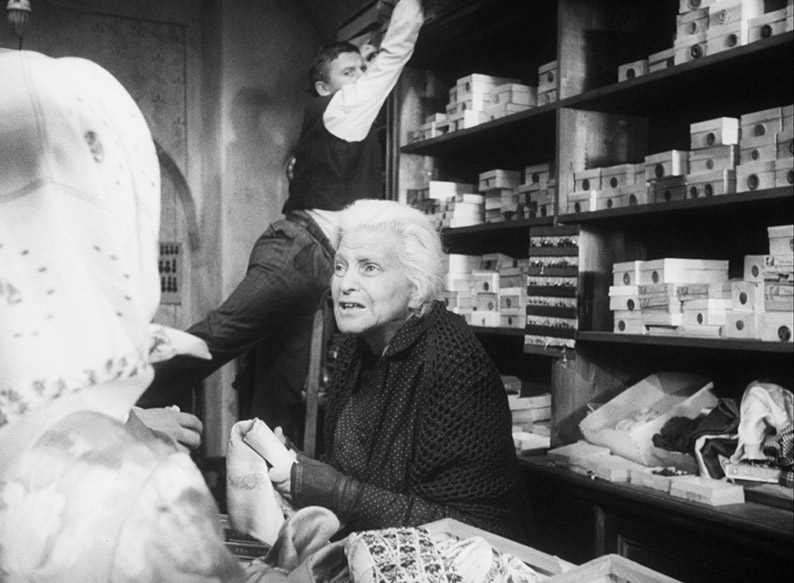
When Tóno arrives at the shop the following day, however, things don't go quite as smoothly as he had probably hoped. Mrs. Lautmannová is half deaf and locked away in a small but seemingly happy world of her own. Tóno's attempts to explain the situation get him nowhere and he is initially mistaken for a debt collector. Enter Imro Kuchár, a long-standing friend of the local Jewish community, who quickly grasps the true purpose of Tóno's visit. After quietly berating Tóno for going along with this dictum ("I'd call you a swine if I hadn't known you so long"), he reveals that the store makes little to no money and that Mrs. Lautmannová gets by on the charity of others. When Tóno then tries to back out of the deal, Imro quickly persuades him to stay on as a preferred protector for Mrs. Lautmannová, for which the Jewish community will pay him a weekly wage.
Knowing nothing of this arrangement with Imro, Evelína is delighted by her husband's new position and greedily speculates on the money and jewellery that she is convinced that Mrs. Lautmannová must have tucked away. Mrs. Lautmannová, meanwhile, is under the impression that Tóno has come to the shop to work as her assistant, a role Tóno fulfils by repairing Mrs. Lautmannová's crumbling furniture and helping to serve customers when business become unexpectedly frantic. All the while he keep up the pretence to his wife that the weekly payments he collects are the profits from shop sales and that he has only kept Mrs. Lautmannová on to help him out during this period of transition. This amusingly peaks when – in what has since become a rather well-worn gag – Evelína unexpectedly pops her head around the shop door when trade is at its busiest, and the hapless Tóno starts barking orders at the half-deaf Mrs. Lautmannová to create the false impression that he is in charge.
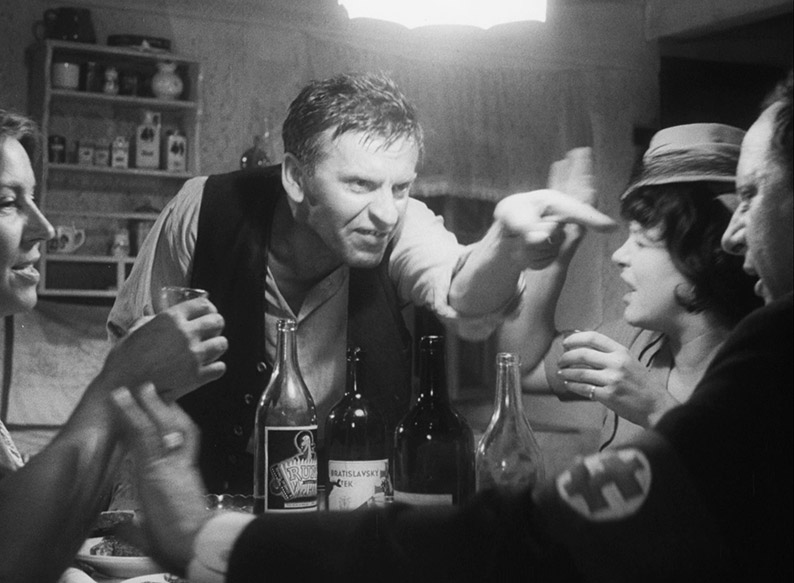
So much of this is played with a cheerfully comic edge that it's easy to forget just how history has told us that fate will intervene. Co-directors Ján Kadár and Elmar Klos get considerable mileage from Mrs. Lautmannová's smiling inability to comprehend the reality of her situation and Tóno's befuddled frustration at not being able to make himself understood without ever coming close to overplaying either. The film is classically shot and briskly paced (in the way that a film like Casablanca could be said to be likewise), and has a real knack for bonding us to characters just a short while after they appear on screen. It certainly proves easy to connect with initially henpecked Tóno, as he resolvedly shrugs off his wife's constant criticism, throws surly looks at his blowhard brother-in-law, and quietly mocks the Führer in song during an improvised game of hopscotch on his way into town. It's thus easy to feel for his awkwardness when he arrives at the shop in the nearest thing he has to a decent suit ("I look like Charlie Chaplin"), even though it's an appointment that we'd all rather he didn't keep, a feeling that's amplified when we first meet the delightfully upbeat and sweetly eager-to-please woman whose shop he has been charged to take for his own. The performances really are crucial here. Jozef Kroner does a lovely line in grumpy cynicism that for me made Tóno instantly likeable ("Go to hell," he snaps at a neighbour who comments on his late-night drinking with Markus, adding, "and the same to you" to his wife when she won't stop brushing his suit jacket), while stage veteran Ida Kaminska avoids overplaying Mrs. Lautmannová's small eccentricities and creates a character so entrancing that it's easy to understand Tóno's reluctance to enforce his new authority on her, and why he ends up caring for her and wanting to protect her instead.
The knock-on effect of this thoroughly engaging and often light-hearted approach is that you almost forget when and where the film is set and what the real-world consequences were for people like Mrs. Lautmannová, right up until the moment they come knocking at the door of every Jew in the town. We're given a few small reminders along the way, from Markus's cautionary warning to Tóno that "a Jew lover is worse than a regular Jew," to the wooden pyramid being constructed in the centre of town whose initial purpose is uncertain but is clearly a pet project for Markus and the Hlinka Guard. But when events take the dark turn that history tells us they inevitably will, the jolt is almost as severe for us as it is for Tóno, who spends the rest of the film wrestling with a moral quandary in which his desire to protect a woman his has come to care for comes into direct conflict with a self-centred panic over his own future safety.
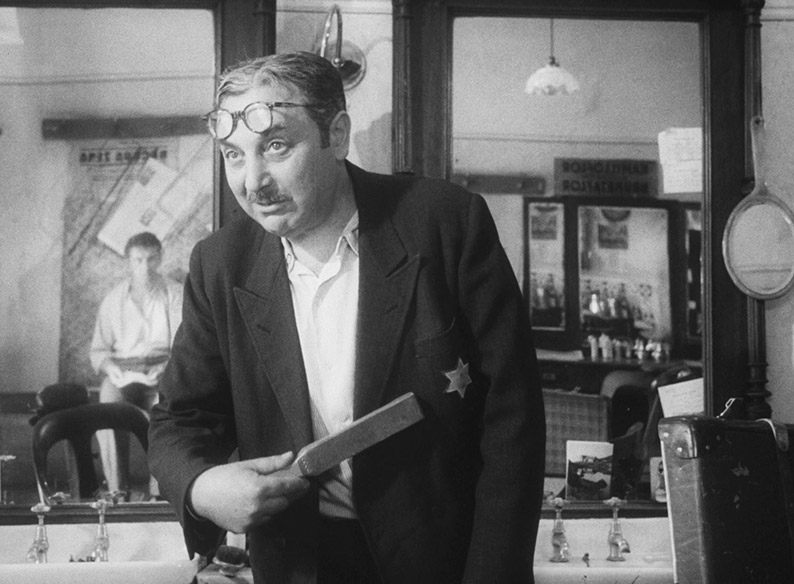
The gravity of a situation that until then for Tóno has been almost a game – one whose rewards for him have proved to be more than financial – is brought home to him (and us) in one of the film's most quietly powerful scenes. As he pays a visit to Katz, town's amiable barber, he finds him packing his belongings away, a Star of David sewn on his jacket and written orders from Markus for his transportation in his hand. "I've been cutting hair here for forty years," he says sadly to Tóno. "Four long decades. Enough hair to fill a barn. Now they've branded me like cattle. Taken away my rights. Taken my property. All according to the law. And at the end, this." Tóno is bemused. "You're a wise man. How has this happened so suddenly?" he asks Katz, who tellingly replies, "I'm not wise and this is not sudden."
This is not sudden. It's a phrase that really stayed with me because it continues to resonate so many years after the event, in no small part because we don't seem able to learn from its terrible implications. Genocide is never the result of a snap decision by one twisted dictator, it grows from small but insidious beginnings, xenophobic ignorance and the scapegoating of economic or social problems onto minority racial or religious groups. And as a practice it appears to be on the rise again, as evidenced in the outpouring of racial hatred that followed Britain's decision to leave the European Union, and the xenophobic propaganda unleashed by tabloid newspapers and certain members of the Leave campaign in the lead-up to it, including a truly despicable poster based directly on Nazi anti-Jewish propaganda.
Like many of the finest Holocaust-themed dramas, The Shop on the High Street doesn't show us the ultimate consequences of this round-up of the town's Jewish population, instead relying on our knowledge of subsequent events to instil these scenes with a sense of terrible foreboding (a similar approach was employed by Czech director Zbynĕk Brynych in his similarly powerful 1962 Transport from Paradise). What does come through with crystal clarity but not a whisper of overstatement is that these good people, who have been cast as somehow subhuman and earmarked for extermination, are no different to the men who seek to wipe them out or those who would stand by and watch on as they are rounded up and shipped off to face an (at this point) uncertain but likely unpleasant fate. These are your neighbours, your colleagues, the people whose businesses you daily frequent and even your friends of many years standing, yet come the day of reckoning it is only their race or religion that defines them. Over seventy years later, it's a cruel and ultimately inhuman judgement that we are all still being regularly programmed to make.
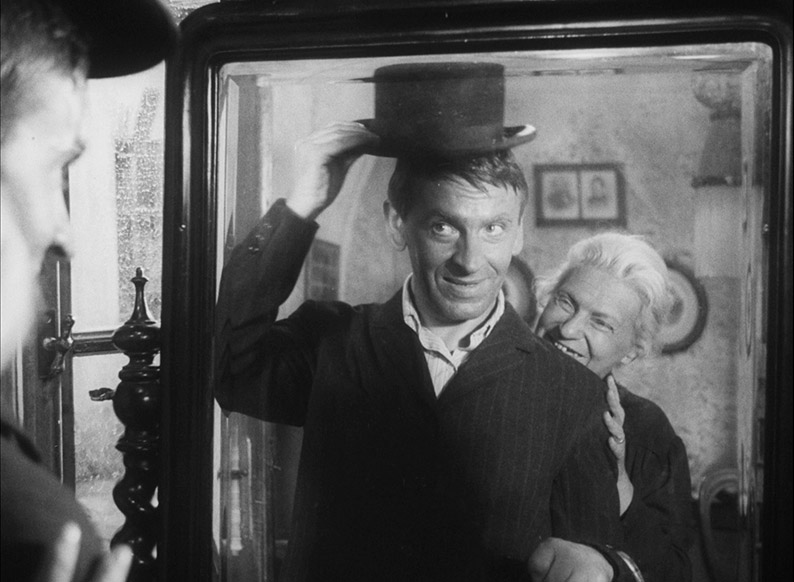
The Shop on the High Street is an extraordinary film that works sublimely on a number of levels. It's an utterly captivating and richly textured work whose characters are beautifully defined and performed, one whose winning blend of drama and feather-light comedy ultimately wrong-foots us and in the process personalising events to genuinely (and appropriately) gut-wrenching effect. Impeccably but never eye-catchingly directed and given an intermittently unsettling edge by Marketa Lazarová, Valley of the Bees and The Cremator composer Zdenek Liska's sometimes disconcerting score, The Shop on the High Street is a genuinely great film from a time when an Oscar win actually counted for something, and a perfect introduction for newcomers to the very real pleasures and rewards of Czechoslovak cinema.
As the title sequence unfolds, the slight picture softness, coupled with a sprinkling of dust spots and small sundry damage, suggest source material that fell a little short of the restoration ideal, but once the film itself gets going you can effectively cast any negative assumptions aside. If Second Run seemed to be deliberately kicking against expectations with their first two forays into the Blu-ray format (the SD-originated Horse Money and the 16mm monochrome reversal Mysterious Object at Noon), with The Shop on the High Street they have a transfer – one prepared by the Czech National Film Archive – that really plays to the strengths of the Blu-ray format. The tonal range of the monochrome image is quite delicious here, delivering solid black levels and blinding whites and a handsome greyscale range between the two, boasting the sort of seductive richness I still only associate with 35mm film. The picture is crisp and the sharpness of the detail exceeds even that of Second Run's best DVDs (and that's saying something, believe me), and there's no judder of movement of the image in frame, a sure-fire sign of digital restoration. Yes, there are still a number of dust spots and the odd bit of slightly more visible damage, but on the whole this is an excellent job.
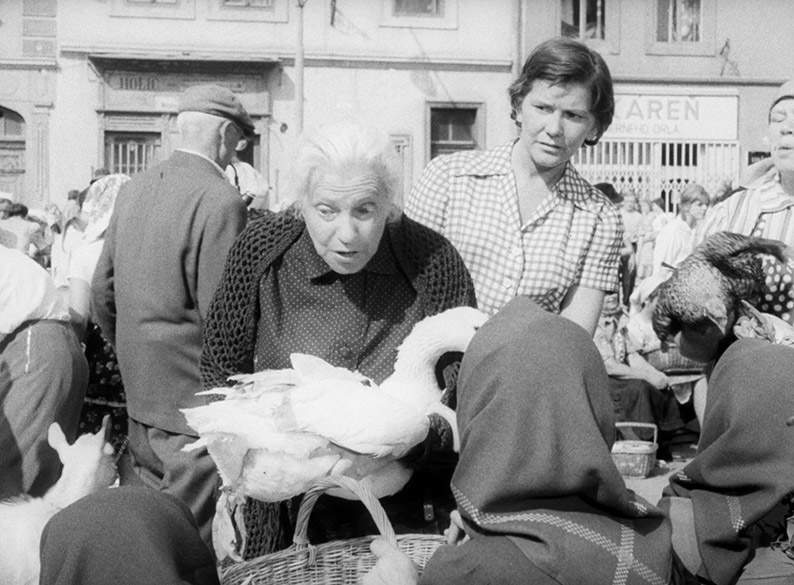
The linear PCM 2.0 mono track has the expected dynamic range restrictions and a few audible pops, usually at what we can assume were the reel changes, but is otherwise clear and clean of any background hiss or fluff.
An Appreciation by Michael Brooke (40:01)
Freelance film writer Michael Brooke, who knows a thing or two about Czechoslovak cinema, here delivers such a comprehensive and richly detailed analysis and appreciation of the film, its makers and its cast, that I seriously considered either completely reworking what I'd already written or abandoning the whole thing and simply recommending that you watch this instead. It probably didn't help that almost every line of dialogue I've quoted in my review is also referenced here, though I reasoned that this is a testament to the very real impact that they have. There's a spoiler warning up front here and it's one I'd definitely heed, as a number of scenes are deconstructed here, including some of those in the film's final act. But once you have watched the film this is essential viewing, and it will likely enhance you're appreciation of what Ján Kadár, Elmar Klos and their talented collaborators have achieved.
Original US Press Kit
All 24 pages of the original US press kit, presented as high definition stills, (which means you can actually read the newspaper clippings), which can be navigated manually with the remote control. The contemporary press reaction appears to have been euphoric.
Booklet
As if the Michael Brooke appreciation wasn't thorough enough, it's complimented here by an excellent and in-depth essay on the film and its directors by Peter Hames, though once again I'd save this until after the film itself. Credits for the film are also included, plus a sprinkling of stills.
A remarkable work in every respect, The Shop on the High Street is an object lesson in how to infuse drama with character comedy in a manner that enhances your appreciation of the appalling truth at the story's core. Beautifully made, wonderfully performed and deeply moving, it may well be the best film I've seen this year, and is handsomely presented on Second Run's excellent Blu-ray release. Highly recommended.
|